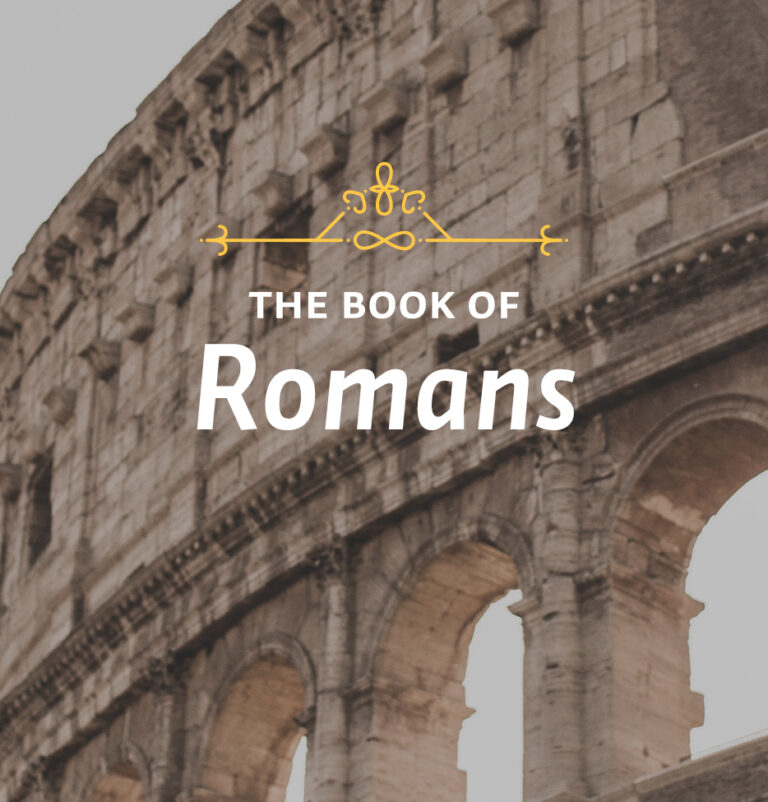
How Should We Then Live? – Part One
How Should We Then Live?Romans 12:1-2Theme: Obedience.In this week’s lessons Dr. Boice teaches us how to live godly lives in an ungodly world. Lesson

How Should We Then Live?Romans 12:1-2Theme: Obedience.In this week’s lessons Dr. Boice teaches us how to live godly lives in an ungodly world. Lesson

How Should We Then Live?Romans 12:1-2Theme: Obedience.In this week’s lessons Dr. Boice teaches us how to live godly lives in an ungodly world. Lesson

How Should We Then Live?Romans 12:1-2Theme: Obedience.In this week’s lessons Dr. Boice teaches us how to live godly lives in an ungodly world. Lesson

How Should We Then Live?Romans 12:1-2Theme: Obedience.In this week’s lessons Dr. Boice teaches us how to live godly lives in an ungodly world. Lesson

How Should We Then Live?Romans 12:1-2Theme: Obedience.In this week’s lessons Dr. Boice teaches us how to live godly lives in an ungodly world. Lesson

Dying, We LiveRomans 12:1-2Theme: Sacrifice.This week’s lessons remind us that the path to eternal life begins with the cross. Lesson

Dying, We LiveRomans 12:1-2Theme: Sacrifice.This week’s lessons remind us that the path to eternal life begins with the cross. Lesson

Dying, We LiveRomans 12:1-2Theme: Sacrifice.This week’s lessons remind us that the path to eternal life begins with the cross. Lesson

Dying, We LiveRomans 12:1-2Theme: Sacrifice.This week’s lessons remind us that the path to eternal life begins with the cross. Lesson

Dying, We LiveRomans 12:1-2Theme: Sacrifice.This week’s lessons remind us that the path to eternal life begins with the cross. Lesson

Living Sacrifice: Its NatureRomans 12:1-2Theme: Holiness.This week’s lessons teach us the extent to which we must offer ourselves to God. Lesson

Living Sacrifice: Its NatureRomans 12:1-2Theme: Holiness.This week’s lessons teach us the extent to which we must offer ourselves to God. Lesson

Living Sacrifice: Its NatureRomans 12:1-2Theme: Holiness.This week’s lessons teach us the extent to which we must offer ourselves to God. Lesson

Living Sacrifice: Its NatureRomans 12:1-2Theme: Holiness.This week’s lessons teach us the extent to which we must offer ourselves to God. Lesson

Living Sacrifice: Its NatureRomans 12:1-2Theme: Holiness.This week’s lessons teach us the extent to which we must offer ourselves to God. Lesson

Living Sacrifice: Its MotiveRomans 12:1-2Theme: God’s mercy.This week’s lessons teach us the nature of God’s mercy and grace to us in Christ Jesus. Lesson

Living Sacrifice: Its MotiveRomans 12:1-2Theme: God’s mercy.This week’s lessons teach us the nature of God’s mercy and grace to us in Christ Jesus. Lesson

Living Sacrifice: Its MotiveRomans 12:1-2Theme: God’s mercy.This week’s lessons teach us the nature of God’s mercy and grace to us in Christ Jesus. Lesson

Living Sacrifice: Its MotiveRomans 12:1-2Theme: God’s mercy.This week’s lessons teach us the nature of God’s mercy and grace to us in Christ Jesus. Lesson

Service That Makes SenseRomans 12:1-2Theme: Reasonable sacrifices.This week’s lessons explore the reasons we should be eager to offer ourselves to God. Lesson

Service That Makes SenseRomans 12:1-2Theme: Reasonable sacrifices.This week’s lessons explore the reasons we should be eager to offer ourselves to God. Lesson

Service That Makes SenseRomans 12:1-2Theme: Reasonable sacrifices.This week’s lessons explore the reasons we should be eager to offer ourselves to God. Lesson

Service That Makes SenseRomans 12:1-2Theme: Reasonable sacrifices.This week’s lessons explore the reasons we should be eager to offer ourselves to God. Lesson

Service That Makes SenseRomans 12:1-2Theme: Reasonable sacrifices.This week’s lessons explore the reasons we should be eager to offer ourselves to God. Lesson

The Pattern of This AgeRomans 12:1-2Theme: “Isms.”This week’s lessons teach us about the dangers of secularism, humanism, relativism, and materialism. Lesson

The Pattern of This AgeRomans 12:1-2Theme: “Isms.”This week’s lessons teach us about the dangers of secularism, humanism, relativism, and materialism. Lesson

The Pattern of This AgeRomans 12:1-2Theme: “Isms.”This week’s lessons teach us about the dangers of secularism, humanism, relativism, and materialism. Lesson

The Pattern of This AgeRomans 12:1-2Theme: “Isms.”This week’s lessons teach us about the dangers of secularism, humanism, relativism, and materialism. Lesson

The Pattern of This AgeRomans 12:1-2Theme: “Isms.”This week’s lessons teach us about the dangers of secularism, humanism, relativism, and materialism. Lesson

This Mindless AgeRomans 12:1-2Theme: Christ’s call to think.This week’s lessons teach us our responsibility to be thinking Christians. Lesson

This Mindless AgeRomans 12:1-2Theme: Christ’s call to think.This week’s lessons teach us our responsibility to be thinking Christians. Lesson

This Mindless AgeRomans 12:1-2Theme: Christ’s call to think.This week’s lessons teach us our responsibility to be thinking Christians. Lesson

This Mindless AgeRomans 12:1-2Theme: Christ’s call to think.This week’s lessons teach us our responsibility to be thinking Christians. Lesson

This Mindless AgeRomans 12:1-2Theme: Christ’s call to think.This week’s lessons teach us our responsibility to be thinking Christians. Lesson

Mind Renewal in a Mindless Age, Part 1Romans 12:1-2Theme: The Christian mind.This week’s lessons teach us how Christians should think. Lesson

Mind Renewal in a Mindless Age, Part 1Romans 12:1-2Theme: The Christian mind.This week’s lessons teach us how Christians should think. Lesson

Mind Renewal in a Mindless Age, Part 1Romans 12:1-2Theme: The Christian mind.This week’s lessons teach us how Christians should think. Lesson

Mind Renewal in a Mindless Age, Part 2Romans 12:1-2Theme: The Christian doctrine of man.This week’s lessons teach us what it means to be made in God’s image. Lesson

Mind Renewal in a Mindless Age, Part 2Romans 12:1-2Theme: The Christian doctrine of man.This week’s lessons teach us what it means to be made in God’s image. Lesson

Mind Renewal in a Mindless Age, Part 2Romans 12:1-2Theme: The Christian doctrine of man.This week’s lessons teach us what it means to be made in God’s image. Lesson

Mind Renewal in a Mindless Age, Part 2Romans 12:1-2Theme: The Christian doctrine of man.This week’s lessons teach us what it means to be made in God’s image. Lesson

Mind Renewal in a Mindless Age, Part 2Romans 12:1-2Theme: The Christian doctrine of man.This week’s lessons teach us what it means to be made in God’s image. Lesson

God’s Good, Pleasing, and Perfect WillRomans 12:1-2Theme: Trust and obey.This week’s lessons teach us that our happiness is to be found in following God’s will.
Lesson

God’s Good, Pleasing, and Perfect WillRomans 12:1-2Theme: Trust and obey.This week’s lessons teach us that our happiness is to be found in following God’s will.
Lesson

God’s Good, Pleasing, and Perfect WillRomans 12:1-2Theme: Trust and obey.This week’s lessons teach us that our happiness is to be found in following God’s will.
Lesson

God’s Good, Pleasing, and Perfect WillRomans 12:1-2Theme: Trust and obey.This week’s lessons teach us that our happiness is to be found in following God’s will.
LessonWe need to prove by our experience that the will of God is indeed what Paul tells us it is, that is, that it is good, pleasing, and perfect. We need to check it out. Moreover, it is by checking it out that we will begin to find out what it actually is.

God’s Good, Pleasing, and Perfect WillRomans 12:1-2Theme: Trust and obey.This week’s lessons teach us that our happiness is to be found in following God’s will.
Lesson

Theme: Justification by Grace
This week’s lessons teach us what justification is, and how a proper understanding of grace and faith are necessary for it.
Scripture: Romans 3:22-24

Theme: What Is Justification?
This week’s lessons teach us what justification is, and how a proper understanding of grace and faith are necessary for it.
Scripture: Romans 3:22-24

Theme: Justification Illustrated
This week’s lessons teach us what justification is, and how a proper understanding of
grace and faith are necessary for it.
Scripture: Romans 3:22-24

Theme: By Faith Alone
This week’s lessons teach us what justification is, and how a proper understanding of grace and faith are necessary for it.
Scripture: Romans 3:22-24

Theme: The Need for Belief and Commitment
This week’s lessons teach us what justification is, and how a proper understanding of grace and faith are necessary for it.
Scripture: Romans 3:22-24

Theme: Four Pivotal Words
This week’s lessons discuss the important benefits that come to every Christian because of their justification given by Jesus Christ.
Scripture: Romans 5:2
“If you’re so smart, why aren’t you rich?” Haven’t you heard this classic put-down of someone who has been acting arrogantly?

Theme: Peace with God
This week’s lessons discuss the important benefits that come to every Christian because of their justification given by Jesus Christ.
Scripture: Romans 5:2

Theme: Union with Christ
This week’s lessons discuss the important benefits that come to every Christian because of their justification given by Jesus Christ.
Scripture: Romans 5:2
Yesterday we looked at the first benefit of our justification, which is peace with God. We also began to look at the second benefit, which is our union with Christ. We saw that this doctrine, found in the teaching of the apostles, goes back to Jesus himself. Let me list a few analogies the Bible uses to describe this union.

Theme: Joy in Suffering
This week’s lessons discuss the important benefits that come to every Christian because of their justification given by Jesus Christ.
Scripture: Romans 5:2

Theme: Hope of Glory
This week’s lessons discuss the important benefits that come to every Christian because of their justification given by Jesus Christ.
Scripture: Romans 5:2

Theme: John Bunyan’s Text
This week’s lessons show how the abounding grace of God triumphs over the sin of anyone who comes to Jesus Christ for salvation.
Scripture: Romans 5:20, 21

Theme: No Reduction of Grace
This week’s lessons show how the abounding grace of God triumphs over the sin of anyone who comes to Jesus Christ for salvation.
Scripture: Romans 5:20, 21

Theme: No Withholding of Grace
This week’s lessons show how the abounding grace of God triumphs over the sin of anyone who comes to Jesus Christ for salvation.
Scripture: Romans 5:20, 21

Theme: Citizens of the Kingdom
This week’s lessons show how the abounding grace of God triumphs over the sin of anyone who comes to Jesus Christ for salvation.
Scripture: Romans 5:20, 21
Yesterday we concluded by looking at the first two stages of the kingdom of grace. Now we need to see the last two.

Theme: Grace and Righteous Conduct
This week’s lessons teach that God’s grace, rather than leading to sin or even an indifferent attitude about it, actually leads to a holy life because we are now dead to sin and have been made alive in Jesus Christ.
Scripture: Romans 6:1-14

Theme: Our Old and Our New Life
This week’s lessons teach that God’s grace, rather than leading to sin or even an indifferent attitude about it, actually leads to a holy life because we are now dead to sin and have been made alive in Jesus Christ.
Scripture: Romans 6:1-14
In yesterday devotional we looked at three mistaken ideas for the meaning of “dying to sin.” Today we begin by looking at two others.

Theme: The First and Great Imperative
This week’s lessons teach that God’s grace, rather than leading to sin or even an indifferent attitude about it, actually leads to a holy life because we are now dead to sin and have been made alive in Jesus Christ.
Scripture: Romans 6:1-14

Theme: Alive to God
This week’s lessons teach that God’s grace, rather than leading to sin or even an indifferent attitude about it, actually leads to a holy life because we are now dead to sin and have been made alive in Jesus Christ.
Scripture: Romans 6:1-14
Yesterday we saw two changes that have occurred from our being made alive to God in Jesus Christ. Here are three more.

Theme: Three Views of the Human Condition
From this week’s lessons we learn that Romans 3 can be considered the heart of the Bible because of the clear and comprehensive way it shows us the depth of our sin, and what the Lord Jesus Christ has done to save us from it.
Scripture: Romans 3
Somewhere in my library I have a pamphlet by Donald Grey Barnhouse entitled How to Mark Your Bible.

Theme: Man’s Ruin in Sin: The Moral Dimension
From this week’s lessons we learn that Romans 3 can be considered the heart of the Bible because of the clear and comprehensive way it shows us the depth of our sin, and what the Lord Jesus Christ has done to save us from it.
Scripture: Romans 3
Verses 10 and 11 capsulize Paul’s whole theology on this subject when he writes, “There is no one righteous, not even one; there is no one who understands, no

Theme: Man’s Ruin in Sin: The Intellectual and Volitional Dimensions
From this week’s lessons we learn that Romans 3 can be considered the heart of the Bible because of the clear and comprehensive way it shows us the depth of our sin, and what the Lord Jesus Christ has done to save us from it.
Scripture: Romans 3
The intellectual dimension involves understanding, and the same principles apply.

Theme: God’s Remedy in Christ
From this week’s lessons we learn that Romans 3 can be considered the heart of the Bible because of the clear and comprehensive way it shows us the depth of our sin, and what the Lord Jesus Christ has done to save us from it.
Scripture: Romans 3
Propitiation comes from the world of ancient sacrifices and concerns the wrath of God. Most of us do not like the idea of wrath. We push it off.

Theme: By Faith Alone
From this week’s lessons we learn that Romans 3 can be considered the heart of the Bible because of the clear and comprehensive way it shows us the depth of our sin, and what the Lord Jesus Christ has done to save us from it.
Scripture: Romans 3
Yesterday we looked at propitiation and justification. The third term is redemption. It is a business term. It has to do with buying something back.

When I was talking about the third chapter of Romans, I pointed out that Romans 3 is the heart of the Bible. If that is true, Romans 8 is the Bible’s climax.

You recall what is said in the third chapter of John’s gospel, the very chapter which contains that great verse beloved by Christians everywhere, beginning, “For God so loved the world . . .” The chapter talks about the gospel: that God sent Jesus Christ that we might have eternal life.

But how can that be that condemnation does not come to us? There should be condemnation for us because we are sinners. I think that in the days before Christ’s crucifixion no one really understood how that could be. Certainly the men who set out to trap the woman did not understand it.

Yesterday we concluded by looking at the first reason we might have for being defeated. The second reason is found in verses 17 to 25, where Paul talks about our present sufferings.

The second reason why there will be no separation from the love of God is the impotence of everything, when set over against the sovereign love of God toward us in Christ Jesus. What are things, when set over against God? Paul talks about a number of things that might tend to separate us from that love.

Theme: Grace Triumphant
This week’s lessons show how the abounding grace of God triumphs over the sin of anyone who comes to Jesus Christ for salvation.
Scripture: Romans 5:20, 21
The third point Romans 5:20, 21 makes about grace is that grace is powerful and triumphant. Sin triumphed for a time, but although “sin reigned in death,” grace is destined to “reign through righteousness to bring eternal life through Jesus Christ our Lord.”

Theme: Dying to Sin
This week’s lessons teach that God’s grace, rather than leading to sin or even an indifferent attitude about it, actually leads to a holy life because we are now dead to sin and have been made alive in Jesus Christ.
Scripture: Romans 6:1-14

With the start of chapter 12, we come in our studies of Paul’s letter to the Romans to the practical section of the book. Ours is a practical age and most people want “practical” teaching. But to call these chapters practical suggests that the doctrinal sections are not practical, and whenever we find ourselves thinking along those lines we are making a mistake and contributing to great misunderstanding.

If revelation is the basis for social morality and ethics, then it is impossible to have valid, effective or lasting morals without it. We must have Romans 1-11 in order to have Romans 12-16.

In Monday’s study I commented on Francis Schaeffer’s book How Should We Then Live?, saying that “then” is the all-important word. Now I note that when we come to the first verse of Romans 12 we discover exactly the same thing, only in this case the important word is “therefore.”

“Therefore” is a linking word, as I have said. We have looked back to what it refers to. Now we should look forward to see what the doctrinal material of chapters 1-11 connects with. I am handling it in seven sections.

True conversion makes a difference in a person’s life. If there are no differences, there is no genuine conversion. But what are the differences? They are precisely those that are spelled out in the remaining chapters of this letter. Laws in themselves change nothing, or at least very little. It is changed people who change everything. And the only thing that ever really changes people is God Himself through the Gospel of our Lord Jesus Christ. If you have been called to faith in Jesus Christ, you are part of a radically changed community, the new humanity. It is your privilege to begin to make changes in our world.

I do not like the word “paradox” used in reference to Christian teachings, because to most people the word refers to something that is self-contradictory or false. Christianity is not false. But the dictionary also defines “paradox” as any statement that seems to be contradictory, yet may be true in fact, and in that sense there are paradoxes in Christianity.

The principle of sacrifice is so foundational to the doctrine of the Christian life that we must be very careful to lay it out correctly, and in order to do that we need to review the foundations for this foundation.

Redemption from sin by Christ is not the only doctrine the Christian life of self-sacrifice is built on. A second foundation is our having died to the past by having become new creatures in Christ, if we are truly converted.

So I ask, who are you willing to believe? Yourself, reinforced by the world and its way of thinking? Or Jesus Christ? I say “Jesus” specifically, because I want to remind you of His teaching from the beginning of the Sermon on the Mount. He speaks there about how to be happy. Indeed, the word is even stronger than that. It is the powerful word “blessed,” meaning to be favored by God.

Paul’s words in Romans 12:1-2 are an urgent appeal to us to do something, to offer ourselves as living sacrifices to God. This is not done for us. It is something we must do. This leads to the fourth and final foundational truth. It is the “obedience that comes from faith,” which Paul wrote about early in the letter, saying, “Through him and for his name’s sake, we received grace and apostleship to call people from among all the Gentiles to the obedience that comes from faith” (Rom. 1:5).

We are to sacrifice ourselves for Jesus, of course, if we love Him. Jesus said, “Greater love has no one than this, that one lay down his life for his friends” (John 15:13), and He did it for us. He did it literally…Now, because He loved us and gave Himself for us, we who love Him are likewise to give ourselves to Him as “living sacrifices.”

What exactly is meant by “sacrifice”? How are we to do it? The first point is the obvious one. The sacrifice is to be a living sacrifice rather than a dead one. This was quite a novel idea in Paul’s day, of course, though we have lost this by becoming overly familiar with it.

Sin can control us through our bodies, but it does not need to. So rather than offering our bodies as instruments of sin, we are to offer God our bodies as instruments for doing His will.

Paul uses the word “holy” to indicate the nature of the sacrifices we are to offer God. Any sacrifice must be holy. That is, it must be without spot or blemish and be consecrated entirely to God. Anything less is an insult to the great and holy God we serve. But how much more must we be holy who have been purchased “not with perishable things such as silver and gold…but with the precious blood of Christ” (1 Pet. 1:18-19).

The final word Paul uses to describe how we should present our bodies to God as living sacrifices is “pleasing.” But this is also a conclusion for what I have been saying this week since the point is that if we do what Paul has urged us to do, namely, to offer our “bodies as living sacrifices, holy…to God,” then we will also find that what we have done is pleasing (or acceptable) to Him.

What is it that motivates people to achieve all they are capable of achieving or to “be all that you can be,” as the Army recruitment ads have it? There are a number of answers.

What is it that motivates Christians to live a Christian life? Or to use Paul’s language in Romans 12:1, what is it that motivates them “to offer [their] bodies as living sacrifices…to God”?

This is not the first time we have had to think about mercy in studying Romans. Mercy is one of three words often found together: goodness, grace and mercy.

Imagine yourself in Adam’s place, living through what I have described. God had told Adam and Eve that they would die, but they had not died. There had been judgments, of course, consequences. Sin always has consequences. But they had not been struck down; and, in fact, God had even announced the coming of a Redeemer who one day would crush Satan’s head and undo his work.

That is the nature of the goodness, love, grace and mercy of our great God. If you are a Christian, shouldn’t it motivate you to the most complete offer of your body to him as a living sacrifice and to the highest possible level of obedience and service?

Today we come to the last phrase of Romans 12:1. The Greek words of this phrase are ambiguous, and can therefore be translated more than one way.

To understand this verse well we must understand the kind of service that is required. We have already spent a good bit of time exploring what this kind of service is about. It concerns what Paul calls “sacrifice.” When we were looking at it in detail earlier we saw that it involves three things.

God intervenes to save us by the work of Jesus Christ who died for us, and by the work of the Holy Spirit who enables us to understand what Jesus has accomplished, repent of our sin, and trust Him for our salvation. Then He has also joined us to Jesus Christ to make us different people from what we were before.

Let me make what I have been saying personal. Are you a believer in Jesus Christ? Are you trusting Him for your salvation? Has the Holy Spirit made you alive in Jesus Christ? If he has, what can be more reasonable than to give yourself to Him? What is more logical than to serve God wholeheartedly in this way?

It is reasonable because God is worthy of our very best efforts. In the fourth chapter of Revelation we read, “You are worthy, our Lord and God, to receive glory and honor and power, for you created all things, and by your will they were created and have their being” (Rev. 4:11).

There are some verses in the Bible that are enriched when we read them in other translations. Romans 12:2 is one of them. In the New International Version the first part of Romans 12:2 says, “Do not conform any longer to the pattern of this world.”

Secularism is an umbrella term that covers a number of other “isms,” like humanism, relativism, pragmatism, pluralism, hedonism and materialism. But it, more than any other single word, aptly describes the mental framework and value structure of the people of our time.

In yesterday’s study I said that there is a proper concern for secular things but that secularism as a worldview is wrong. I need to say the same thing about this next popular “ism,” humanism.

Since we’ve been talking about humanism this week, we also have to talk briefly about relativism. Because if man is the focal point of everything, then there are no absolutes in any area of life, and everything is up for grabs.

I want to look ahead one phrase to what Paul says we are to be: not “conformed,” but “transformed” by the renewing of our minds. There is a deliberate distinction between those two words, as I am sure you can see. Conformity is something that happens to you outwardly. Transformation happens inwardly.
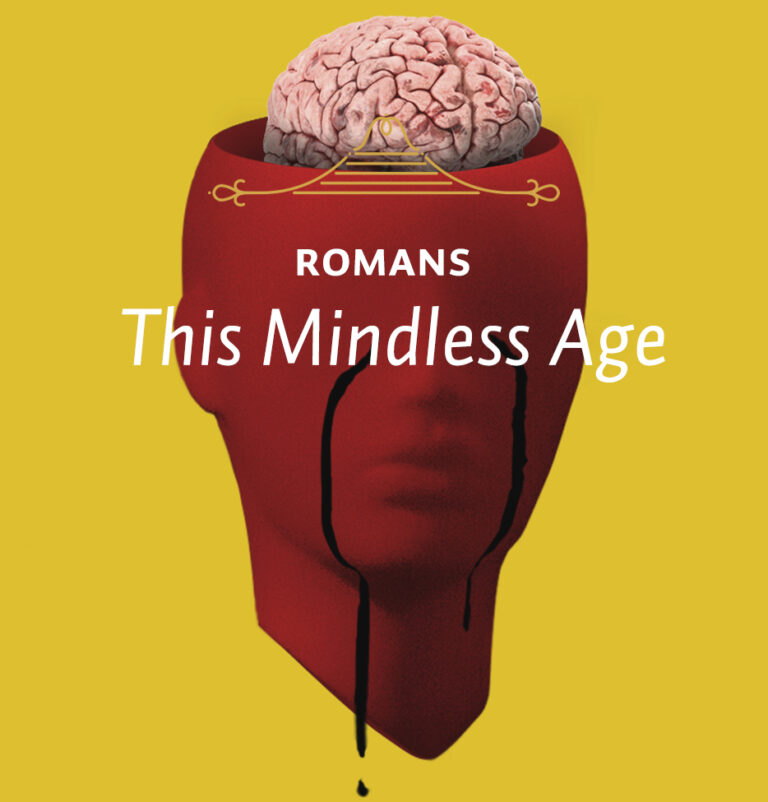
In our time there is no longer a distinctly Christian way of thinking. There is to some extent a Christian ethic and even a somewhat Christian way of life and piety. But there is no distinctly Christian frame of reference, no uniquely Christian worldview, to guide our thinking in distinction from the thought of the secular world around us.

Television is certainly capable of imprinting “the pattern of this world” on us. An academic study of the negative impact of television on culture has been provided by a man named Neil Postman, a professor of communication arts and sciences at New York University. It is called Amusing Ourselves to Death: Public Discourse in the Age of Show Business.

A great deal of what Postman develops in his book, Amusing Ourselves to Death, is reinforcement for what I have been describing as mindlessness. And “the pattern of this age” today is certainly mindless. So let me review two specific areas of bad influence, as he sees it.

Was Jesus amusing? Were Martin Luther, John Calvin, John Wesley or Jonathan Edwards entertainers? We must learn to seek truth, and avoid being caught up in the search for entertainment which has so permeated our culture.

This week we’ve looked at different ways that “the pattern of this world” eases its way into our worldview. And this is the point at which we also need to talk about genuine mind renewal for Christians, which is what I will continue with next week.
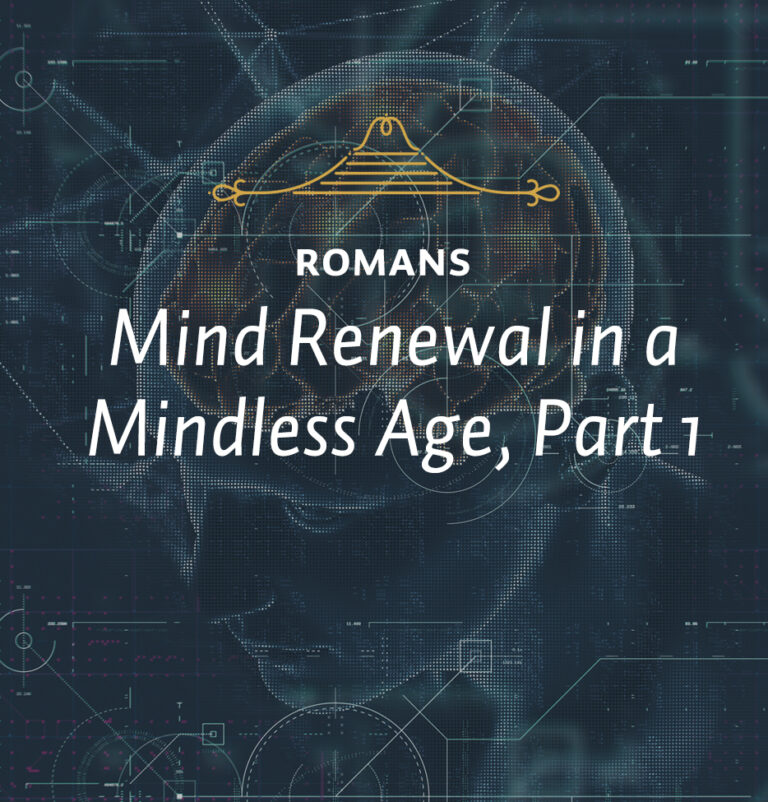
As believers we need to reject the world’s thinking and begin to think as Christians. This is what the apostle Paul is writing about in our text from Romans 12:2: “Do not conform any longer to the pattern of this world, but be transformed by the renewing of your mind.” This means that our thinking is not to be determined by the culture of the world around us, but, rather, we are to have a distinctly different and growing Christian worldview.

Where do we start if we want not to conform to this world? There is a sense in which we could begin at any point, since truth is a whole and truth in any area will inevitably lead to truth in every other area. But if the dominant philosophy of our day is secularism (which means viewing all of life only in terms of the visible world), then the best of all possible starting places is the doctrine of God, for God alone is above and beyond the world and is eternal.

To avoid being conformed to the world we must also understand the doctrine of revelation. The God who exists has revealed Himself. Do you remember how Francis Schaeffer put it in the title of one of his books? He called it, He Is There and He Is Not Silent. That is exactly the point. God is there, and He has not kept Himself hidden from us. He has revealed Himself in nature, in history and especially in the Scriptures.

If there is a God and if he has made us to have eternal fellowship with him, then we are going to look at failure, suffering, pain and even death differently. For the Christian these can never be the greatest of all tragedies. They are bad. Death is an enemy (1 Cor. 15:26). But they are overbalanced by eternal matters.

In 1989, Westerners were astounded by the political changes in Eastern Europe. Country after country repudiated its seventy-two-year Communist heritage and replaced its leaders with democratically elected officials. We rejoiced in these changes, rightly. But, though the American media with its blindness to things spiritual will not tell us, the changes in the Eastern bloc have not come about by the will of one person, Mikhail Gorbachev or any other, but by the spiritual vitality of the people.

I find it significant that this is where Paul’s statements about being transformed by the renewing of our minds, rather than being conformed to the patterns of this world, end. They end with proving the way of God to be the best way and the will of God to be perfect.

In this verse “will” is to be interpreted in its context, and the context indicates that the will of God that we are encouraged to follow is the general will of offering our bodies to God as living sacrifices, refusing to be conformed to the world’s ways, and instead being transformed from within by the renewing of our minds. It is this that we are to pursue and thus find to be good, pleasing and perfect, though, of course, if we do it, we will also find ourselves working out the details of God’s specific will for our lives.

The will of God that we are talking about is good, pleasing and perfect. In other words, it teaches about the nature of God’s will for us as well as the fact that God has one.

We need to prove by our experience that the will of God is indeed what Paul tells us it is, that is, that it is good, pleasing, and perfect. We need to check it out. Moreover, it is by checking it out that we will begin to find out what it actually is.

The Lord Jesus Christ took it upon Himself to prove that God’s will was indeed good, pleasing and perfect, even though it involved the pain of the cross, which in itself hardly seemed good, pleasing or acceptable.

It is a matter of handling first things first: first, the matter of my relationship to God; second, a proper evaluation of myself; and third, a right relationship to other persons.

In discussing right relationships, there are two possible errors in self-evaluation, and Paul suggests both of them in what he says: first, to think of ourselves more highly than we ought to think; and second, to think too lowly of ourselves, which is to have a false humility. Today I want to spend time talking about the problem of thinking too highly of ourselves.

One of the problems we have is that we usually think about ourselves too much. Yet the solution Paul offers is not to stop thinking about ourselves entirely but instead to start thinking about ourselves in a right way. We are to think of ourselves “with sober judgment.”

The second phrase Paul uses in Romans 12:3 for thinking rightly about ourselves is “in accordance with the measure of faith God has given you.” This is a little bit more than simply seeing ourselves as made in the image of God, indwelt by the Holy Spirit of God and having part in the overall plan of God. It involves what each one of us is uniquely, that is, as different from other people, and it leads to the discussion of spiritual gifts that follows in this chapter.

A proper humility in which we learn to think soberly about ourselves does not lead to self-abnegation or inactivity, which honors no one. Instead it leads to the energetic use of every gift and talent God has given, knowing that they have come from Him— that no glory is ever due to us— but because they do come from Him, they must be used faithfully and wholeheartedly for His glory.
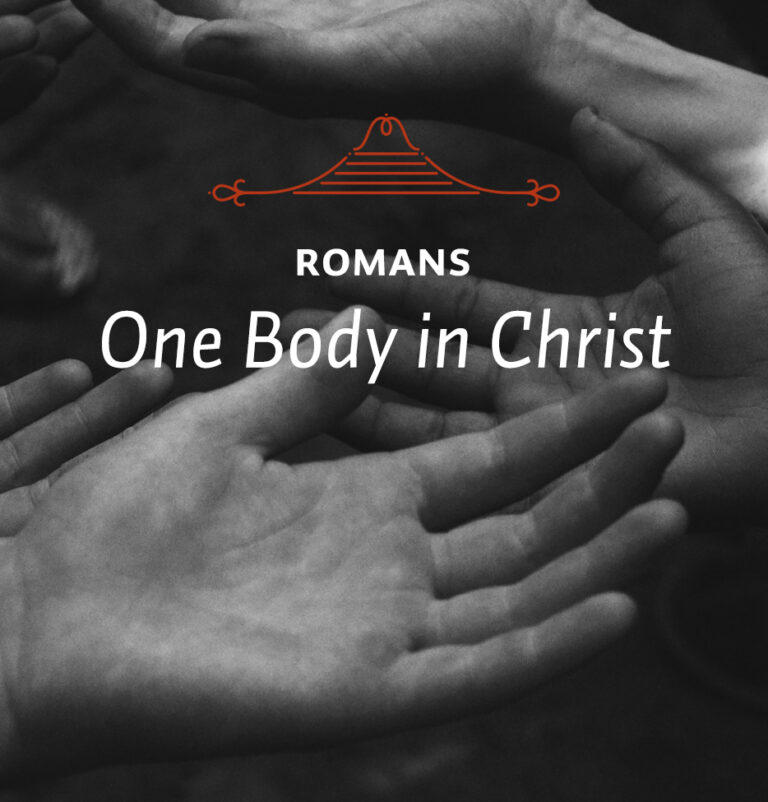
Anyone who is interested in the doctrine of the church and senses its importance must be a bit surprised to notice how little the word “church” actually occurs in the Bible. The word is not found in the Old Testament at all. The first time it occurs is in Matthew 16:18, then again in Matthew 18:17. But it is not in the other gospels. It is scattered throughout Acts, of course (about eighteen times), but it is only found five times in Romans, all in chapter 16 (vv. 1, 3, 5, 16, 23). There are quite a few instances in 1 Corinthians and Ephesians (eighteen and nine times respectively), but then the references become infrequent again.

Paul’s image is very helpful at this point. For when he speaks of the body of Christ, obviously he is speaking of those who belong to Christ, who are joined to Him in exactly the sense in which he speaks about our being joined to Christ in Romans 5 and elsewhere. This is a spiritual reality, invisible but supremely real.

There is a second important truth about the Church taught by Paul’s image of it as Christ’s body. Not only does that image define the Church as the community of those who have been joined to Christ. It also teaches that there is but one Church. That is, there are not multiple churches, even less mutually competing churches. There is but one Church, because Jesus has but one body.

Since we are part of a body with many members, what is the challenge we face in an individualistic age like ours? Well, the answer is not the ecumenical movement. Our task is not to create the unity of the body, above all not from the top down. The unity of the body is a given for those who are “in Christ.”

Different gifts! It is hard for many of us to recognize this and accept it, because we are always wanting other Christians to be like ourselves and function like ourselves, or be cogs in our machine rather than contributing to another Christian work. Paul knew Christians who had this trouble too, but he tells everyone that we must accept this diversity if the church is to function as it should.

How many gifts are there? Nineteen are mentioned in the New Testament. But the number is not absolute. Different words may describe the same gift, for example, serving and helping, and there are probably gifts that could be mentioned but are not. In Romans 12 there are seven items, and we’ll look at all of them as the week goes on.

Today let’s look at two more of the gifts God gives us for the building up of His body of believers.

Today we’ll look at the gifts of encouraging and contributing to the needs of others. These gifts are important to the ministry of Christ’s body, as are the other gifts we’ve talked about this week.

I want to end this week’s study on spiritual gifts by looking at the remaining two gifts in the listing of Romans 12:6-8.

After the first two verses of Romans 12, which establish the principles by which sound doctrine is to be applied to godly living, Paul has begun to write about the church. Yet his words are no abstract theologizing.

Romans 12:9 states two specific things about love. First, true love is genuine. “Love must be sincere,” says Paul. Second, love must be discriminating. “Hate what is evil; cling to what is good,” is how the apostle puts it.

Today we’re continuing our look at Paul’s commentary on love from 1 Corinthians 13: “Love is patient, love is kind. It does not envy, it does not boast, it is not proud. It is not rude, it is not self-seeking, it is not easily angered, it keeps no record of wrongs. Love does not delight in evil but rejoices with the truth…”

Today we will look at the section of 1 Corinthians 13 which says that love will endure even when things like prophecies, tongues and the quest for knowledge have ceased. And we’ll see why love is more important even than such enduring things as faith and hope.

There are times in Bible study when an examination of the Greek text is very helpful. This is not always so, because most Bible translations convey the meaning of the original languages accurately and a person who does not know Greek can get along very well with the English. But sometimes the Greek is helpful, and one of those times is now.

As we continue our study of how love functions, we come to the second of Paul’s dative cases, which is about honor and is closely related to what we studied yesterday about brotherly love. This is why the two ideas are combined in verse 10. A literal translation might be, “And in respect to honor, lead the way for each another.” In other words, “Don’t wait around for people to recognize your contributions and praise you. Instead, be alert to what they are contributing and honor them.”

In our study of how love functions, we come today to the sentence which reads, “Never be lacking in zeal, but keep your spiritual fervor, serving the Lord” (v. 11). The word “fervor” (NIV) or “fervent” (KJV) is from a verb meaning “to boil.” So a literal translation of this phrase would be: “In respect to the spirit (or Spirit), boiling.” Unfortunately, since boiling suggests heat and we think of heat as having to do with anger, it would be better to think of this as a Christian “bubbling over” or even, as the Revised Standard Version has it, “being aglow with the Spirit.”

As we continue to learn about love in Romans 12, verse 12 introduces three more items, and these three go together. This might be paraphrased, “In so far as we have cause to hope, let us be joyful; in so far as we have cause of pain, let us hold out; in so far as the door of prayer is open to us, let us continue to use it.”

Did you know that someone who loves is also someone who prays consistently? It’s right here in verse 12. A literal translation of this verse might be “and in regard to prayer, continuing.” Isn’t “continuing” an interesting word to use? We might have expected any one of a number of other words. But Paul says “continuing” because he was aware that this is just the problem. It is not that we never pray. We almost have to, if we are Christians. But we get tired of praying, our minds wander and we neglect prayer precisely when we most need it.

My good friend Michael Scott Horton has written a book called Made in America, in which he examines the impact of American culture on Christianity, especially evangelical Christianity. The impact comes from a variety of cultural sources, he says, but one of these is our consumerism. In America everything is sold, from toothpaste to politicians. And the way it is sold is by appealing to the dreams and desires of the people. Nothing bad is ever faced. Disappointments are ruled out. This has its effect on Christianity.

Today we come upon the most radical teaching in Romans 12:14-16. Having spoken of the application of Christian doctrine to the way the individual is to think of himself and of the way he is to think of others within the fellowship of the church, Paul moves on to speak of those who are not yet Christians and of how we are to treat them. In fact, to put it even more radically, he moves from how we should treat those who love us (or should love us) to how we should treat those who hate us because of our relationship to Christ.

The fact of persecution is well established. If we are Christ’s and if we stand for Christ against the world, we will experience it. But now the question is: How we are to respond to persecution? In Romans 12:14 Paul tells us that we are to “bless” our persecutors. We are to “bless” and “not curse.” Again, this is a conscious reflection of Jesus’ common teaching.

Yesterday we talked about prayer as a means for blessing those who persecute us. But there are more ways than that of being a blessing, and Paul discusses these in verses 15 and 16. The way they are written, these verses could apply to Christians as well as to enemies. But since they are bracketed by references to those who persecute us, in verse 14 which comes before and verse 17 which comes after, Paul must be thinking of how Christians should relate to unbelievers.

We should bless our enemies by showing them empathy and getting along well with them. We should behave in humility, with a willingness to associate with those we think are lower than we are. The trouble with exhortations of this nature, practical as they may be, is that they seem very far beyond us and therefore discourage us if we start to take them seriously.

Right or wrong? Making that distinction rightly is what civilization—not to mention right religious behavior—is all about. But that is what we have lost in America. We do not believe in right and wrong. Therefore, it is against that serious national problem that we come to Paul’s challenge to Christians in Romans 12:17, where we read, “Be careful to do what is right in the eyes of everybody.”

In order to pursue a goal, there must be a goal. To have a strong moral society, we must have moral absolutes. Otherwise, all we can have is what is pragmatic or expedient, which is what education, politics and American life as a whole has come to. It is why we do not have any heroes today and why we do not have any moral leadership in the country.

We need to have our national morality renewed. But, of course, that is only another way of talking about the problem. Corporate morality is the one thing we cannot have if the only thing we can say about values is that they are relative.

We live in a trashy culture, worse—a sinful, evil, ugly and perverted culture. It is hard not to be sullied by it. Yet it was no different in Paul’s day. The Greek and Roman world of the first century was a slime pit. But in spite of it, Paul says that Christians are to set their minds on good things, things that are true, noble, right, pure, lovely, admirable, excellent and praiseworthy. We are to seek the best rather than the worst of the world around us.

In spite of everything I have said this week about America’s moral decline and the loss of a fixed moral standard for most people, the real problem is having the will to do what is right even when we know what it is.
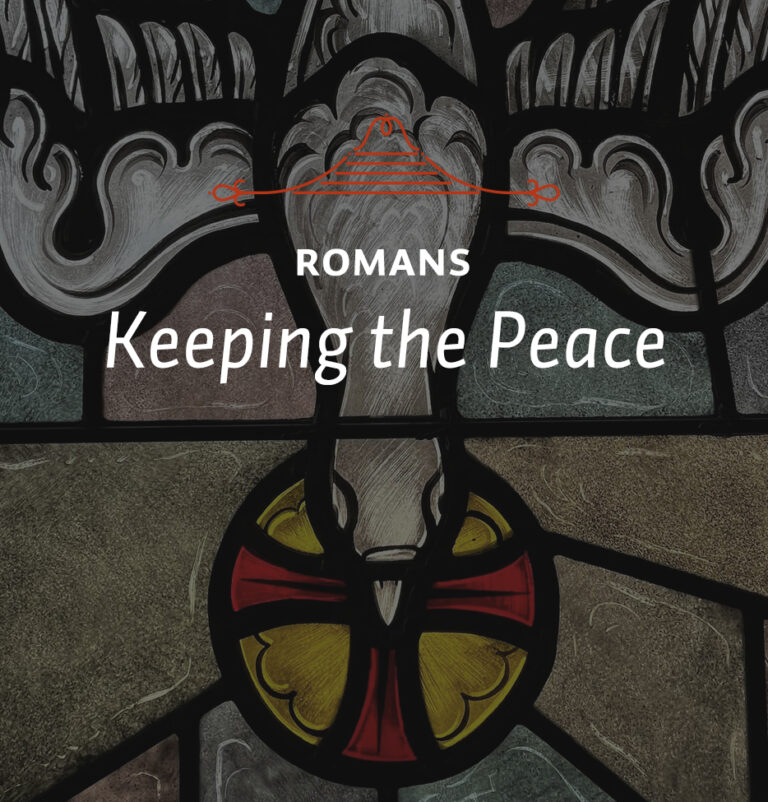
Some divisions are based on important matters of theology and practice, of course. But many are not, and the self-righteous, antagonistic, fighting spirits that lie behind these unnecessary divisions and perpetuate them are a scandal among those who profess to follow Jesus Christ. Jesus said, “Blessed are the peacemakers” (Matt. 5:9). He asserted, “All men will know that you are my disciples if you love one another” (John 13:35).

The first thing we notice about Paul’s challenge to Christians to live a life of peace is his sobering realism. He begins, “If it is possible” and “as far as it depends on you…” (v. 18). This way of speaking recognizes two potential sources of difficulty: 1) the behavior of other people may negate peace; and 2) there may be issues at stake that will make peace impossible even from the side of the Christian.

“Do not take revenge, my friends, but leave room for God’s wrath, for it is written: ‘It is mine to avenge; I will repay,’ says the Lord” (v. 19). We see in this verse that an important point Paul has to make about keeping peace is forbearance. This is categorical teaching. It does not say, “Do not avenge yourselves except under the following three or four conditions” or “except under extreme circumstances.” It says, “Do not avenge yourselves.” That means never. Fighting back is not Christian.

As we continue our study of what it means to “live at peace with everyone,” I want to examine verse 20, which develops a contrast with the thought of taking vengeance into our own hands. “On the contrary,” it says, “If your enemy is hungry, feed him; if he is thirsty, give him something to drink. In doing this, you will heap burning coals on his head.”

This week I have been working through what Paul is teaching about peacekeeping or peacemaking, and I have stressed that it requires realism, forbearance and active goodness to those who do wrong. But perhaps you have been thinking—I know the thought comes to me—“But I can’t do it. I don’t care if this is the Christian way or is the example of Christ, I can’t do it. Nothing is ever going to get me to the point of wanting to do good to those who hate me.”

Today we come to the last sentence of Romans 12, and it is worth noting, as we look back over the preceding verses, that Paul has said three times that we are not to return evil for evil. Verse 14 commands, “Bless those who persecute you; bless and do not curse.” Verse 17 urges, “Do not repay anyone evil for evil.” Now, verse 21, the last verse in the chapter, demands, “Do not be overcome by evil, but overcome evil with good.” This is Paul’s overriding theme in this section.

Our text has two parts. The first part says, “Do not be overcome by evil.” That is the negative. The second part says, “But overcome evil with good.” That is the positive, and of the two it is the hardest to accomplish.

Triumphing by overcoming evil with good sounds great, but how are we to live like this? That is the real problem. How is this to be done in our lives, we being what we are?

If we are to learn what it is to overcome evil with good, and actually overcome, we must study the example of Jesus Christ. For this is what Jesus did, and if He is our Savior, we will love Him and want to be like Him in this as in His other acts and characteristics.

We have come to the end of Romans 12. As we look back over this remarkable chapter, starting with the offering of our bodies to God as living sacrifices and ending with the offering of ourselves and our own best efforts to others in order that, by the grace of God, we might overcome their evil with good, we marvel at the wisdom, scope and power of a Gospel that can do that.

Canadian Committee of The Bible Study Hour
PO Box 24087, RPO Josephine
North Bay, ON, P1B 0C7